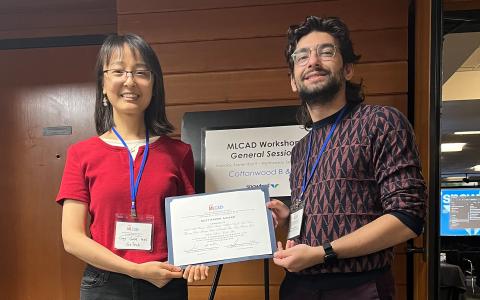Led by Assistant Professor Cong "Callie" Hao, the group is creating an open-source platform that enables hardware developers to contribute designs for use by machine learning practitioners.
A research group from the School of Electrical and Computer Engineering (ECE), led by Assistant Professor Callie Hao, won the Best Paper Award at the 2024 ACM/IEEE International Symposium on Machine Learning for CAD, held in Salt Lake City, Utah, from Sept. 9–11.
The award-winning paper, “HLSFactory: A Framework Empowering High-Level Synthesis Datasets for Machine Learning and Beyond,” introduces an open-source infrastructure that simplifies the contribution and sharing of hardware designs.
This platform allows developers to submit their designs to a common pool, making it easy for machine learning practitioners to access the data they need to train their algorithms, ultimately driving advancements in hardware design.
The framework addresses a major challenge in applying machine learning to chip design:the scarcity of high-quality training data. By being open-source, HLSFactory encourages a wide range of contributions from the community, creating a richer dataset for researchers and developers.
“HLSFactory creates unified platform that the entire community can leverage to drive more scientific discoveries and improve design outcomes,” said Hao.
The software was developed through Hao's Software/Hardware Co-Design Lab.
ECE Ph.D. candidate Stefan Abi-Karam was the lead author on the paper. Abi-Karam previously won the Community Award at the 33rd International Conference on Field-Programmable Logic and Applications (FPL) 2023, for his work on “GNNBuilder: An Automated Framework for Generic Graph Neural Network Accelerator Generation, Simulation, and Optimization.” The award recognized his contributions to the open-source community, underscoringthe group’s dedication to open-source tools and hardware design, according to Hao.
ECE Ph.D. candidates Rishov Sarkar and Hanqiu Chen also contributed to the paper, alongside collaborators Allison Seigler, Sean Lowe, Zhigang Wei, Nanditha Rao, and Lizy Kurian John from the University of Texas at Austin, and Aman Arora from Arizona State University.
Hao, who joined the Georgia Tech ECE faculty in 2022, specializes in efficient hardware design and machine learning algorithms. Her research focuses on reconfigurable, high-efficiency computing and developing practical electronic design automation tools. She has previously been recognized with several prestigious awards, including the NSF CAREER Award and the Intel Rising Star Faculty Award, for her groundbreaking work in hardware design research.
